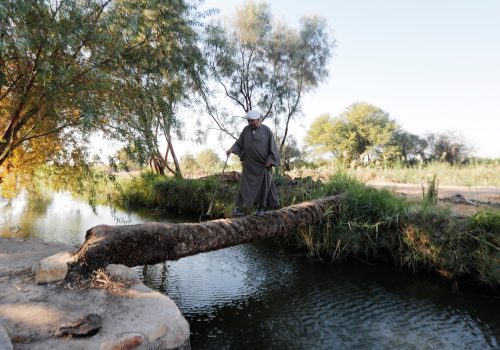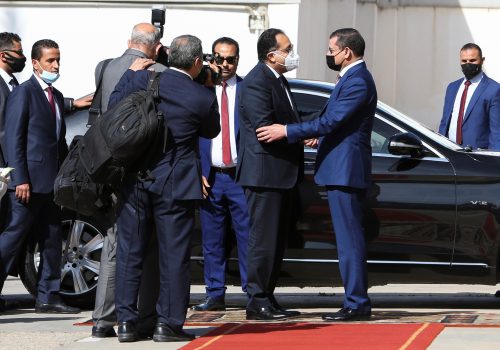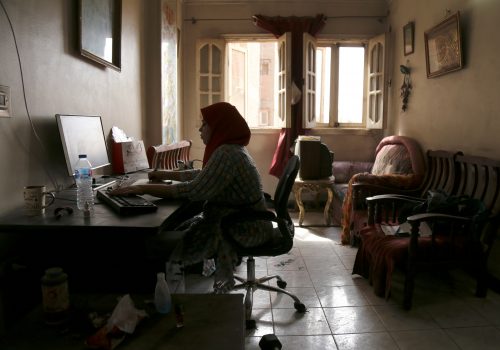What will the US-Egypt Strategic Dialogue look like? Here’s a preview.
On November 8-9, an Egyptian delegation led by Foreign Minister Sameh Shoukry is expected in Washington for the latest iteration of the United States-Egypt Strategic Dialogue. The dialogue—the first to be held under the Joe Biden administration—was confirmed in October following a meeting between US Secretary of State Antony Blinken and his Egyptian counterpart on the margins of the United Nations (UN) General Assembly in September.
The US-Egypt Strategic Dialogue is one of the longest-standing in the region, established under the Bill Clinton administration in 1998 and held periodically since then, apart from a pause from 2009-2015 that occurred with the start of the Barack Obama administration and the subsequent onset of the 2011 Arab uprisings. Though primarily symbolic, the dialogue serves as an opportunity for senior-level engagement across a broad swath of bilateral priorities.
For Egyptian leadership, this year’s dialogue is an opportunity to reaffirm its role as a vital US partner in the region at a time when Cairo is seeking to revive its leadership on regional issues. US officials have said that deepening bilateral ties will require Egypt to demonstrate responsiveness to the Biden administration’s criticism of Egypt’s systemic human rights issues. For the US, the dialogue is a chance to strengthen cooperation on longstanding issues like the Israel-Palestinian conflict, seek to influence Egypt’s approach on emerging issues like the recent military coup in Sudan, and encourage constructive engagement on issues like the Grand Ethiopian Renaissance Dam (GERD). As always, US-Egypt military cooperation and bilateral economic ties will underpin the discussions.
With Egyptian and US officials making their final preparations for the dialogue, what should we expect to be the key areas for discussion and concrete outcomes beyond the communiques?
Neighboring issues
Egypt will likely highlight its role as a key mediator on Israeli-Palestinian issues, particularly regarding its effort to achieve a ceasefire between Israel and militant group Hamas in May. This will serve as a point of focus to underscore the value Egypt brings as a regional partner. It’s no coincidence that Egypt hosted Jordan’s King Abdullah II and Palestinian Authority President Mahmoud Abbas in September to revive discussions over a two-state solution, welcomed new Israeli Prime Minister Naftali Bennett in the first official trip by a leader of Israel to Egypt in more than a decade, and held talks with Hamas over prisoner exchanges and building a longer-term truce with Israel, among other issues. US leadership at the dialogue should affirm and support Egypt’s leadership on these issues as a core area where interests generally align.
Egypt will also likely come ready to press the Biden administration to take a more prominent role in talks between Ethiopia, Sudan, and Egypt over GERD, which Cairo considers an existential threat to its water security and regional position. As Ethiopia begins preparations over the coming year for a third-phase filling of the dam and African Union-mediated talks continue to stagnate, Egypt has turned to the UN Security Council and US for support, with Egyptian Ambassador to the US, Motaz Zahran, laying out Egypt’s position in an April opinion piece titled: “Only Washington Can Save the Renaissance Dam Negotiations Now.”
Thus far, the Biden administration’s approach has been to avoid involving itself in mediating directly. While US Special Envoy for the Horn of Africa, Jeffrey Feltman, has had some engagement on the issue, the situation is complicated by the widening Ethiopian civil conflict over Tigray, which is Ethiopian Prime Minister Abiy Ahmed’s sole preoccupation at the moment, and Sudan’s recent military coup, both of which present nearer-term concerns for regional stability and can derail any hope of engaging those parties in renewed GERD talks anytime soon. At a time when Egypt’s support on Sudan is important for the US, demonstrating US willingness to do more on the GERD issue—when the situation allows—could be a concrete positive outcome from the dialogue.
The Sudanese military’s coup in late October and subsequent use of force against protestors bring a pressing regional concern to the dialogue—one where Egypt and US interests are not clearly aligned. The US, UN, and European Union have all condemned the military takeover, with President Biden issuing a statement calling on the military to allow the Sudanese people to protest peacefully and for Sudan to return to its civilian-led transitional government. At the reported urging of the US, Egypt called for “self-restraint and responsibility” in Sudan “to prioritize the welfare of the country and national agreement,” but did not condemn the coup or call for the civil transition to be restored. Egypt doubled down on this position by declining to join the US, Saudi Arabia, United Arab Emirates, and United Kingdom in a statement on November 3 calling for the “full and immediate restoration” of the transitional government. Reports have also emerged that Sudan’s military leader traveled to Egypt for meetings just before the coup to ensure Cairo’s support.
Egypt’s military leadership under Abdel Fattah al-Sisi naturally prefers military rule in Sudan. Egypt sees it as a potential path to Sudanese stability and has itself long been military-led and had its own military-backed coup with popular support in 2013. The two countries’ militaries are already closely tied and a military-led government in Sudan would likely support Egypt’s strong opposition to the GERD. However, military rule could provide cover for Islamists to regain political influence—a development anathema to President Sisi’s agenda. The US should warn Cairo against these secondary effects of supporting the coup. Ultimately, the best the US is likely to secure from Egypt at the dialogue is an agreement to continue withholding explicit support for the Sudanese military over other parties, at least in the near-term. US willingness to engage more actively in the GERD negotiations could incentivize such restraint.
Other regional concerns
Several North African and Eastern Mediterranean issues are likely to be addressed during the Strategic Dialogue. Amid an uncertain political and security environment, both the US and Egypt have expressed support for Libya’s upcoming presidential elections in December and parliamentary elections in January 2022. At this pivotal moment for Libya, the US should use the dialogue to press Egypt to engage responsibly with Libyan stakeholders, especially Libyan National Army leader Khalifa Haftar in the east of the country (whom they have backed militarily) to promote stability as a priority over influencing election outcomes.
Egypt’s efforts to strengthen cooperation with its neighbors in the Eastern Mediterranean are likely to play positively during the dialogue. In addition to Egypt’s role in setting up the Eastern Mediterranean Gas Forum in 2020, a move which has largely been praised, its relationship-building with Greece and Cyprus is viewed as positive. Egyptian efforts to engage productively but cautiously with Turkey and Turkey’s regional competitors are also relatively uncontroversial for the Biden administration.
While China’s activities in Egypt are arguably modest compared with the Gulf and elsewhere in the region, and Beijing has not sought to increase military cooperation with the Egyptian Armed Forces, US strategic competition with China will undoubtedly make an appearance at the dialogue. China has been an active investor and construction partner for Egypt’s New Administrative Capital, and concerns about Beijing’s involvement in Egypt’s technology and communications infrastructure have caught the attention of the Biden administration.
Similarly, US concerns over Egypt’s purchase and planned receipt of Russian Su-35 fighter aircraft are another fundamental and unresolved issue. The sale has been reported since 2018, though the aircraft have not yet been delivered. When delivered, US sanctions under the Countering America’s Adversaries Through Sanctions Act could be triggered. Secretary Blinken has raised the issue in previous conversations with his Egyptian counterpart, and a further US warning on this and broader Egyptian cooperation with Russia could potentially be a part of this dialogue.
Human rights and other areas of cooperation
Egypt has taken several steps to get ahead of public and private Biden administration calls for human rights improvements by releasing a handful of political prisoners, announcing a National Strategy for Human Rights (albeit to mixed reviews), and lifting the state of emergency that Egypt has operated under since 2017, which gave the government broad authority for arrests and detentions. These are small steps where broad structural changes are needed, are far short of what many human rights activists would like to see, and could easily be reversed by the Egyptian government. However, they indicate some degree of responsiveness to pressure that US officials should seek to expand at the dialogue, nodding to progress being made while pressing for more.
Several other arenas for strategic discussion of US-Egypt bilateral security and economic cooperation exist. This includes the regular Military Cooperation Committee meetings, the thirty-second round of which was held in September. Nonetheless, military cooperation will be covered during the dialogue given its central role in the bilateral relationship. The critical development on this front in recent months was the decision by the Biden administration to withhold $130 million of the $300 million in US military aid to Egypt that is conditioned on human rights concerns. Following the news in September that the funds would be withheld, Egyptian officials will likely highlight their aforementioned human rights measures. The importance of continued coordination on counterterrorism, including on Islamic State of Iraq and al-Sham activities in the Sinai and through the Combined Maritime Forces multinational partnership, will likely also be a point of discussion.
Given the number of geopolitical and security issues to be covered, discussion of economic policy is likely to play a supporting role during this iteration of the dialogue. However, Egypt’s drive to grow foreign direct investment and the US interest in seeing a stable and growing Egyptian economy means that the economy is likely to be a productive topic of conversation. In the category of issues to address, the US might raise intellectual property protection, supporting small and medium-sized enterprises, and similar items. Unlikely to be raised is the ever-growing role of the Egyptian military in the Egyptian economy. Overall, economic issues will be far from the most contentious issues discussed.
As with most high-level, multi-issue bilateral engagements, the US-Egypt dialogue is not intended to result in dramatic policy developments but rather communiques that emphasize areas of agreement. Nonetheless, the dialogue is an important milestone in defining what the US-Egypt relationship will look like under the Biden administration and is an opportunity for both sides to strengthen a bilateral exchange that has both a long history and future potential. The results of US-Egypt cooperation on emerging regional geopolitical developments will shape the relationship’s trajectory, as will Egypt’s progress, or lack thereof, towards substantively addressing its approach to human rights and inclusive government.
Allison Nour is nonresident senior fellow with the Atlantic Council’s Middle East Programs. She is a vice president at The Cohen Group, where she leads client engagements covering a range of global markets and policy issues.
Further reading
Wed, Jun 2, 2021
Egypt has a water problem—and no, it’s not only the GERD
MENASource By
The Nile River, a once seemingly unending water resource serving Egypt as a dependable and mighty lifeline for millennia, now barely reaches the Mediterranean Sea.
Tue, Jun 1, 2021
Egypt recalibrated its strategy in Libya because of Turkey
MENASource By
It is evident that the strategic pivots of Egyptian leadership in Libya are adapting and evolving in concordance with developments on the ground and keeping in mind wider regional implications—particularly its relations with Turkey.
Tue, May 11, 2021
Co-opting cybersecurity in Egypt
MENASource By
Cybersecurity is one of several frequent and overlapping justifications for censorship by the Egyptian government, in addition to strengthened counterterrorism and media regulation.
Image: U.S. Secretary of State Antony Blinken meets with Egyptian Foreign Minister Sameh Shoukry, on the sidelines of the 76th Session of the United Nations General Assembly, in New York, U.S., September 22, 2021. Jason DeCrow/Pool via REUTERS


